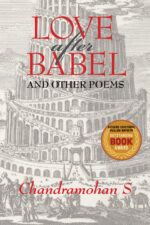Chandramohan S (Sathyanathan) is an Dalit Indian poet, short story writer and a
social critique based in the south Indian state of Kerala. He is pursuing research in
mathematics, apart from being a translator, editor and a social activist.
Chandramohan is a member of the P.K. Rosi foundation, a cultural collective (named after the legendary, pioneering Dalit actress) that seeks to demarginalise Dalit-Bahujans. His poetry collections Warscape Verses (2014) and Letters to Namdeo Dhasal (2016), were shortlisted for the Srinivas Rayaprol Poetry Prize and the Harish Govind Memorial Prize.
Chandramohan coordinates English-language poetry readings in Kerala as well as a subaltern cultural collective there; in 2016 Outlook Magazine listed him as Dalit Achiever of the Year.
-
Love after Babel and other poems
USD $ 5.00 USD $ 15.30Price range: USD $ 5.00 through USD $ 15.30Select options This product has multiple variants. The options may be chosen on the product pageLove after Babel and other poems
USD $ 5.00 USD $ 15.30Price range: USD $ 5.00 through USD $ 15.30Love after Babel is a collection of poems that deal with themes such as caste, the resistance of Dalit people, Dalit literature, islamophobia and other political themes, with almost one hundred poems divided into three sections (Call Me Ishmail Tonight; Name Me a Word; Love after Babel). The introduction is by Suraj Yengde (award-winning scholar and activist from India, author of the bestseller Caste Matters, inaugural postdoctoral fellow at the Initiative for Institutional Anti-racism and Accountability, Shorenstein Center on Media, Politics and Public Policy at the Harvard Kennedy School).
Chandramohan’s poems are dialogues of the ‘ self’ with the ‘other’. He brings to life a world that subverts myths, literary canons, gender and caste stereotypes by pooling in sparklingly new metaphors with sensitivity and care. He draws his images from contemporary incidents as well as myths and legends of yore, and delves deep into the politicized realm, thus ‘rupturing the hymen of demarcations’ of identity, resistance, repression and love.
Select options This product has multiple variants. The options may be chosen on the product page


